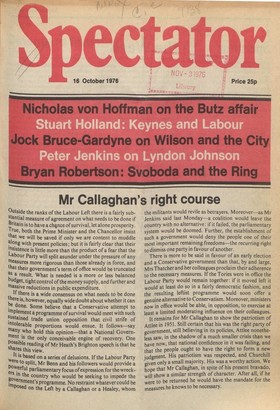Mr Callaghan's right course
Outside the ranks of the Labour Left there is a fairly substantial measure of agreement on what needs to be done if Britain is to have a ch4nce of survival, let alone prosperity. True, both the Prime Minister and the Chancellor insist that we will be saved if only we are content to muddle along with present policies; but it is fairly clear that their Insistence is little more than the product of a fear that the Labour Party will split asunder under the pressure of any measures more rigorous than those already in force, and that their government's term of office would be truncated as a result. What is needed is a more or less balanced budget, tight control of the money supply, and further and massive reductions in public expenditure. If there is a wide consensus on what needs to be done there is, however, equally wide doubt about whether it can be done. Some believe that a Conservative attempt to Implement a programme of survival would meet with such s. ustained trade union opposition that civil strife of Intolerable proportions would ensue. It follows—say many who hold this opinion—that a National Government is the only conceivable engine of recovery. One Possible reading of Mr Heath's Brighton speech is that he shares this view. It is based on a series of delusions. If the Labour Party were to split, Mr Benn and his followers would provide a Powerful parliamentary focus of expression for the wreckers in the country who would be seeking to impede the government's programme. No restraint whatever could be imPosed on the Left by a Callaghan or a Healey, whom the militants would revile as betrayers. Moreover—as Mr Jenkins said last Monday—a coalition would leave the country with no alternative : if it failed, the parliamentary system would be doomed. Further, the establishment of such a government would deny the people one of their most important remaining freedoms—the recurring right to dismiss one party in favour of another.
There is more to be said in favour of an early election and a Conservative government than that, by and large, Mrs Thatcher and her colleagues proclaim their adherence to the necessary measures. If the Tories were in office the Labour Party would remain together : if it moved left it would at least do so in a fairly democratic fashion, and the resulting leftist programme would soon offer a genuine alternative to Conservatism. Moreover, ministers now in office would be able, in opposition, to exercise at least a limited moderating influence on their colleagues.
It remains for Mr Callaghan to show the patriotism of Attlee in 1951. Still certain that his was the right party of government, still believing in its policies, Attlee nonetheless saw, in the shadow of a much smaller crisis than we have now, that national confidence in it was failing, and that the people ought to have the right to form a new judgment. His patriotism was respected, and Churchill given only a small majority. His was a worthy action. We hope that Mr Callaghan, in spite of his present bravado, will show a similar strength of character. After all, if he were to be returned he would have the mandate for the measures he knows to be necessary.


































